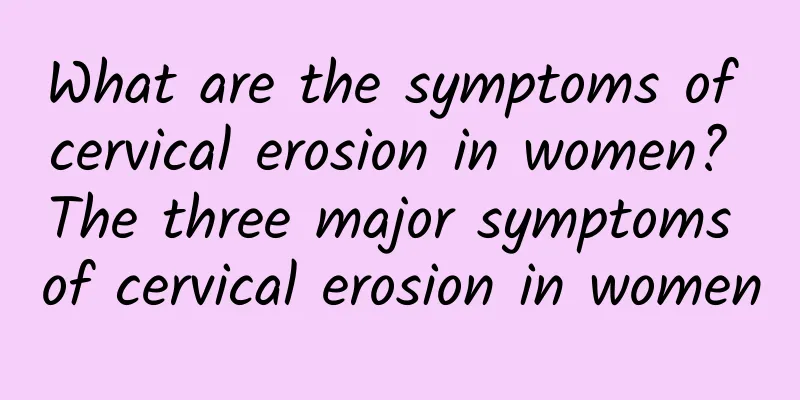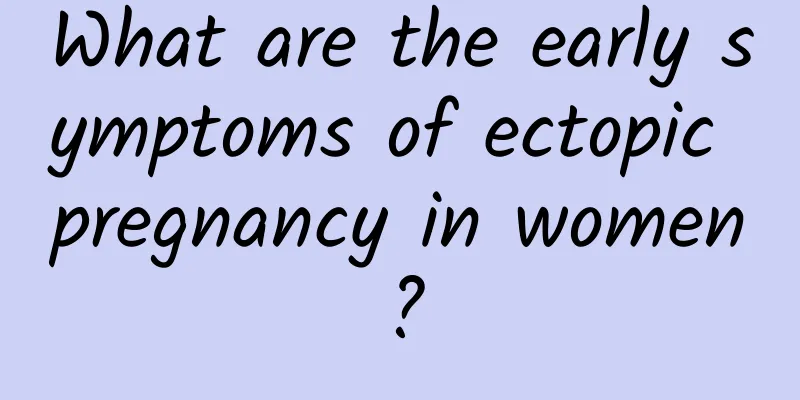How long does it take for bleeding to occur after menstruation stops in an ectopic pregnancy?

|
Ectopic pregnancy usually causes bleeding after 6 to 8 weeks of amenorrhea, but a small number of women may not bleed. Next, let's analyze this issue in detail. 1. Normally, most patients with ectopic pregnancy will experience vaginal bleeding 6 to 8 weeks after amenorrhea. This is because after the death of the ectopic pregnancy embryo, the body will have irregular vaginal bleeding symptoms. The color of the bleeding is usually dark red or dark brown, and the amount of bleeding is small, generally not exceeding the amount of menstrual bleeding. However, there are a small number of patients with ectopic pregnancy who have more vaginal bleeding, even similar to the amount of menstrual bleeding. In this case, vaginal bleeding is usually accompanied by the discharge of decidual tubular or decidual fragments, which is caused by the shedding of the uterine decidua. Vaginal bleeding generally stops after the villous trophoblast cells are completely necrotic and absorbed. 2. A small number of ectopic pregnancy patients will not bleed after menopause. For patients with early ectopic pregnancy, if the gestational sac is small and the local stimulation is weak, it may not cause endometrial withdrawal bleeding. These patients with ectopic pregnancy will not bleed after menopause. 3. The symptoms of ectopic pregnancy bleeding are different from normal menstruation. Vaginal bleeding caused by ectopic pregnancy is usually accompanied by abdominal pain, shoulder pain and other symptoms. The bleeding is darker in color and the amount of bleeding is unstable, which may be more or less at times. If such symptoms occur, it is recommended to seek medical attention in time to avoid delaying treatment. 4. The diagnosis and treatment of ectopic pregnancy are very important. If you have unexplained vaginal bleeding after menopause, especially if it is accompanied by abdominal pain, you should go to the hospital for examination as soon as possible. Through B-ultrasound, blood HCG and other tests, you can determine whether it is an ectopic pregnancy. If it is confirmed to be an ectopic pregnancy, treatment is required according to the specific situation. Common treatments include drug therapy and surgical treatment. 5. It is also important to prevent the occurrence of ectopic pregnancy. Female friends should pay attention to maintaining good living habits in daily life, avoid smoking and drinking, maintain a proper weight, have regular gynecological examinations, and promptly detect and treat gynecological diseases such as pelvic inflammatory disease. Reasonable use of contraceptive measures and avoiding multiple miscarriages can also reduce the risk of ectopic pregnancy. Ectopic pregnancy is a serious gynecological emergency, and timely detection and treatment are critical. I hope this article can provide some useful reference and help for everyone. Remember, when there is an abnormality in the body, it is the wisest choice to seek medical treatment in time. |
<<: Is cervicitis cervical erosion?
>>: Low progesterone leading to irregular menstruation
Recommend
Corpus luteum destruction is effective in treating ectopic pregnancy
Corpus luteum ablation is an effective method for...
What are the most common harmful manifestations of painless abortion?
Painless abortion is a common operation to termin...
Vulvar leukoplakia will affect sexual life
The appearance of white thickening of the vulvar ...
The salt content in New Year's dishes exceeds the limit, 3 grams of salt in one mouthful? Doctors warn: 3 groups of people with chronic diseases are at high risk of developing them
Salt-based seasoning is the soul of many New Year...
Do you feel edema and fat during menstruation? Eat 4 Super-Draining Foods! Nutritionist: Don’t miss out on diuretic drinks and high-potassium foods
Girls face uncomfortable symptoms during menstrua...
What to do with vaginitis during pregnancy? Here are 8 tips to prevent it!
How to prevent vaginitis during pregnancy? Due to...
The harmful manifestations caused by adnexitis
What is adnexitis? Many people actually have a va...
Characteristics of menopausal functional uterine bleeding
Menopausal functional uterine bleeding refers to ...
Can I get pregnant if I have mild candidal vaginitis?
Can I get pregnant if I have mild candidal vagini...
Five lifestyle habits to effectively prevent the occurrence of adnexitis
The occurrence of adnexitis has caused serious ha...
How harmful is endometrial tuberculosis?
Generally speaking, early-stage endometrial tuber...
What medicines are used for female vaginitis and cervicitis? Vaginitis and cervicitis are recommended to be used in this way
Fungal vaginitis is also called candidal vaginiti...
Can I take birth control pills if I have pelvic inflammatory disease? There is no contradiction between the two.
Pelvic inflammatory disease is very common clinic...
Losing 40kg in 1.5 years, but sagging breasts were reshaped and reshaped
I finally succeeded in losing weight, but my skin...
What is vulvovaginitis?
What is vaginitis? This is a concern for everyone...









